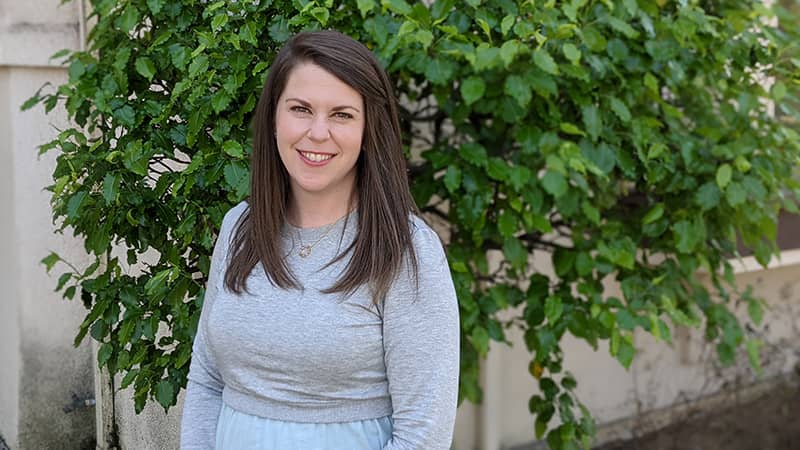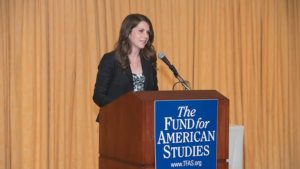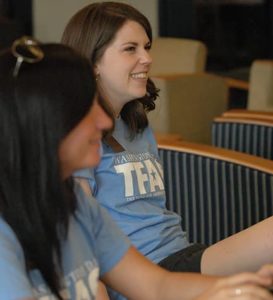
Haley Sisler ’07, FTE Planning + Outreach Program Director
TFAS students know firsthand the transformational benefits of our programs. Some alumni participate in multiple programs to see more of what TFAS has to offer, and some alumni are so captivated by TFAS’s impact they return as staff members. This affords them the opportunity to pass along their enthusiasm for liberty and leadership to the next generation of TFAS students. In our interview series with these individuals, we’re introducing the alumni staff members to showcase the people behind our programs. You can find the other featured interviews linked at the bottom of this page.
In this feature, we’ll hear from Haley Sisler, a 2007 alumna of the Business + Government Relations program who worked at TFAS from 2008-2012 with admissions, recruitment and program management for TFAS’s D.C. Summer Programs. Today Haley leads planning and outreach for TFAS’s high school programs through the Foundation for Teaching Economics (FTE), which is headquartered in California.
 TFAS: Which memory stands out to you as a key part of your TFAS experience?
TFAS: Which memory stands out to you as a key part of your TFAS experience?
Haley Sisler: A major highlight for me as a TFAS student was when I was asked to attend several legislative hearings during my summer internship in D.C., take notes and report back to my supervisor. I vividly remember attending that first hearing and diligently taking notes – not exactly sure what was going to be important to my supervisor when I got back. I felt like the stakes were high as I was the only representative from our office, but at the same time, I felt like a valued member of the team, contributing to the success of my supervisor’s briefs. It was the first time I really felt like I was accomplishing professional work (rather than just busy work jobs as a college student), and that feeling stuck with me as incredibly important to find in a career.
TFAS: What is the most important lesson you learned from participating in a TFAS program?
HS: I learned several valuable lessons as a TFAS student during my summer in D.C. – the most valuable was how it was OK, and actually a good thing, to work with, develop friendships with, and surround yourself with people who agree and disagree with you. Prior to TFAS, I had never been surrounded with so many driven, focused, interested and invested peers before. It was such a highlight to find those like-minded individuals. And not necessarily like-minded in the sense that we always agreed with each other; actually, it was quite the opposite. But that’s what was wonderful about the TFAS experience. I took away the knowledge that disagreeing with others on issues or beliefs didn’t mean that our friendship needed to cease. Rather, my respect for others grew immensely, as did our friendships, regardless of which side of the aisle or issue we identified. Civil discourse – that’s the most important lesson I learned, and something I deeply value today.
I took away the knowledge that disagreeing with others on issues or beliefs didn’t mean that our friendship needed to cease. Rather, my respect for others grew immensely, as did our friendships, regardless of which side of the aisle or issue we identified. Civil discourse – that’s the most important lesson I learned, and something I deeply value today.” – Haley Sisler ’07
TFAS: How did your participation in a TFAS program prepare you for the future?
HS: My participation in TFAS prepared me in many ways for a future career. It taught me the value of a hard day’s work, about dedicating yourself to something you feel is important, to create and value professional and personal relationships with others, and to question your beliefs in a thoughtful, positive way so you understand what you believe and why. All of these lessons still benefit me today and do so on a regular basis throughout various facets of my life, both personally and professionally.
 TFAS: What is it like working at FTE?
TFAS: What is it like working at FTE?
HS: Working at FTE is a great experience. We have a collaborative team that is focused and driven to provide the best opportunities for high school students and teachers to receive an economics education – something that is sorely lacking in many K-12 districts across the country. We’re passionate about the programs we deliver, and working alongside others that feel strongly about the education we’re providing is a joy. I’ve been lucky enough to work in both offices of TFAS and FTE – currently in Davis, California, and back in Washington, D.C., as well. Working here has brought not only purpose in my career, but also some lifelong friends that I would not have otherwise met.
TFAS: What is the most rewarding aspect of working for TFAS?
HS: The most rewarding part of working for TFAS is the transformation that happens to students, whether they’re part of a week long program, or in D.C. for the full summer. Students enter TFAS programs with an idea of what their experience will be like, and time and time again, they leave with stories, memories and experiences they never thought they would have. It’s incredible to be a part of delivering programs that allow for such transformation.
TFAS: What would you like to say to prospective TFAS students?
HS: If you’re on the fence about committing to a program, I would strongly encourage you to push through that unknown and commit. I promise you will not be sorry! I didn’t know what would come of my program experience or where it would take me, but it was the single most formative part of my college experience.

